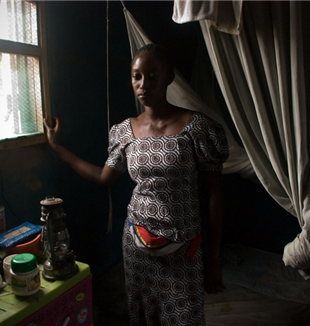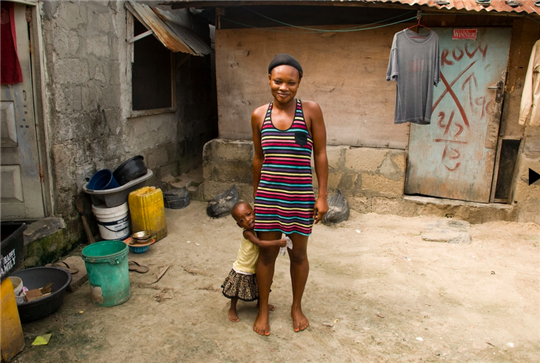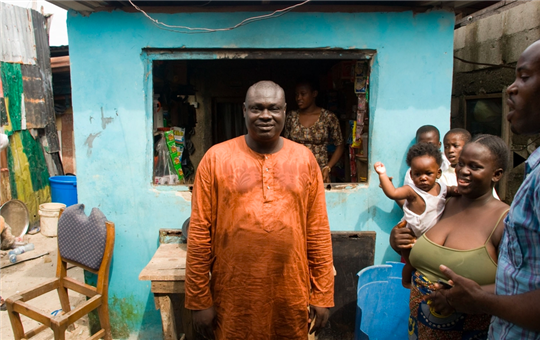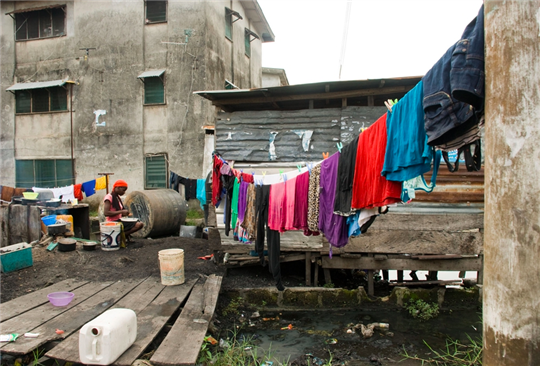
Nigeria: Beauty in Lagos
A slice of life from the Nigerian megalopolis, where a bored group of young Christians rediscovered the faith.“Did you see something beautiful in Lagos?” It is a trick question. You can tell by the smile that challenges you. There, outside, there is a massive body that holds in its belly 18 million people. The neighborhoods of the upper classes, those in the oil business, seem to be peripheries in ruin, even if they have Porsches and Bentleys in the garage. Not to speak of the slums, from which you see, passing on the highway, a sinister smoke rising in the backlight. The beaches of Ikorodu are covered in a blanket of bags and plastic bottles. Boko Haram, who in the majority-Muslim north kills Christians (and Muslims), has started to make its presence felt even in these parts. The city is full of refugees. And the police have already stopped some attacks. How to respond with sincerity without being unkind? By speaking the truth: “the people”.
The CLU students at Unilag, the University of Lagos, are seated in the hut that serves as the meeting place for the community. Abraham, 21 year old, tells about how he met the movement through Tete, someone about whom he said at a certain point: “I want to be happy like him.” Anthony met the community because he sang in the parish choir, Collins because he was good at dancing. All of them were bored young people who, at a certain point, like Florence, encountered another way of living the faith. Leda is also with them. She doesn’t come from a Christian family and says: “I always thought that the Church was a place where all they did was ask you for money. Then, one day, I heard them talking and said to myself: ‘These people are talking about me.’” Dolapo arrives late and sits down in silence. He has the build of an Olympic sprinter. From the look on his face, you can tell that something has happened. We learn that he failed an important exam for the thousandth a time. After a few songs, someone will make him laugh with a joke.
These young people seem like nothing compared to the vastness of Nigeria. 170 million people. The laboratory for international Islamic terrorism in the heart of Africa. With a president, Muhammadu Buhari, elected in May 2016 also with the votes of those Christians who wanted to respect the succession with Muslims. In the South, rich in petroleum, where the massacres by Boko Haram are rarely reported in the local papers, tensions build up under the surface between the different ethnic groups. It is the inheritance of the Nigerian Civil War.
In the Fall, the CLU students organized a showing of “La Strada Bella”, the video on the 60th anniversary of CL. It was the first public event put on by the university students in years. They invited friends and professors. Thirty people came. Abraham didn’t understand that he had to give an introduction. He improvised, but pulled it off: “I am happy in this companionship. I want you to be happy too.”
Barbara is often with them. In Lagos since 2005, she is a Memor Domini, from Rimini, and director of the NGO Loving Gaze. She has been the leader of the Nigerian community for a few years. The young people affectionately call her Babi. She lives with Alda, also from Rimini, Alba from Reggio Emilia, Fiorenza from Milan, and Lucia from Verona. Their house is the epicenter of the life of the community. It is also a center for Guido, general manager of a multinational company which builds infrastructure for the oil industry. He has four thousand employees under him. Many hours of work, many fish to fry, an armored car with an armed escort to go around the city. His family remained in Ancona, and he, as often as he can, invites himself to dinner at the Memores’ house. “When I talk to him on the phone, he is always in a hurry, but always happy,” Barbara says: “One time I asked him: ‘Guido, how are you like this?’, and he said: ‘I am happy because I am talking to you.’” At the last he assembly, he said the same thing to everyone: “In my work, I can make mistakes that have very serious consequences. But when that happens, my pride is not wounded. I suffer because of the thousands of families involved. To hold on, I have to live these circumstances in front of Christ, in relationship with Him. Otherwise I’d be crushed.”
Charles, an engineer, also has the responsibility for a lot of workers. At the end of the School of Community, sometimes, he shows videos on his smart phone of his employees laughing, joking, or singing. “Someone at the office said it was stupid of me to treat them well. They are convinced that, if I do that, they will take advantage of it. But how could I treat them like beasts? I am wanted and loved. I know, they could not understand and trick me. But I want to take a risk on their freedom.”
The other hub, on which the community turns, is the Saint Kizito Clinic, in Jakande, a slum where a million people live. It was here that, in 1989, everything began, when Chiara Mezzalira started to take care of women and children from the shantytown. With her the house of the Memores was born and then the beginning of the work of AVSI, and then of Loving Gaze. It was then that Stephen Okagbue met CL. A senior chief, he recalls, with a face that lights up, his encounters at La Thuile with Father Giussani.
Today the clinic is run by Loving Gaze, which also occupies another little health center in a Muslim neighborhood called Idi Araba, and collaborates with two schools: Saints Peter and Paul in Lekki and Saint John, for the children of the fishermen in Ikurundu. Alda is the health director of the clinic. Recently, she was invited to a conference in Idi Araba, where she was the only foreigner and the only non-Muslim. In the neighborhood, they don’t see many people like her, and at the end of the meeting a few of the local mothers came up to ask for a photo. It was a few days after the terrorist attacks in Paris. Alda says: “In that moment, I wanted them to be able to recognize the value of their life. I wanted them, through the slit in their burka, to see something. I felt the need to look at them truly for who they are, to be able to communicate that they are a good.”
Roland is a tall guy, with a beard and an intense look. He met the movement when he was at the university. Today he is a small business owner and works in real estate. He knows how to sing. At the vacation with the Ugandans, he was part of the Alpine choir. He recently learned, although he doesn’t speak a word of Italian, “La Mente Torna”, the song by Mina. He sang it at the beginning of the School of Community assembly. “This song says that when you meet the person you love, you find yourself. This is exactly the experience I had with Christ. When I recognize Him, I come alive again.”
In the North, after Sister Caterina Dolci returned to Italy, for security reasons, Father Peter Kamai, the rector at the seminary in Jos, was the only remaining member of the CL community. It was almost impossible to see each other because of security and transportation difficulties. It was the same for Port Harcourt, the industrial center of the South-West, where Tete, Rose and Emeka live.
In September, the community visitor, Rose Busingye, came.
There were forty people, between adults and students, at the assembly. From then on, Barbara recalls, it seemed like the work of School of Community came alive again for many people. Up until the beginning of Summer, there were only a few groups that found it difficult to meet up. Traffic, distance, not much money in their pockets. The last year and a half were truly difficult. First the Ebola crisis. Then fear about what would happen after the presidential elections, with a civil war around the corner. And finally the explosion of one of the great contradictions that beset the largest producer of petroleum in Africa: fuel scarcity. For weeks there was no gas in the city. Kilometers of lines outside the gas stations, not knowing if it would be possible to fill up.
Today, for many, getting together to work on the books of Father Giussani has become a necessity. And so a few small groups were born in various parts of the city, so that it would be easier to meet. One in Lekki, one in Ikoyi, one at Saint Kizito, one with Guido that meets with a couple of people after 8:30 p.m. (the evening is the most dangerous time to go out, but they find a way to make it happen), and others still. Godfrey speaks about the difficulties with his work and with his girlfriend. “At the beginning, you think you are capable, then everything slips out from under you. Only within the relationship with Christ is it possible to be present in the things that happen. Only looking at Him do I find that I am free.” So much so that one time he said to Steve: “If I don’t do School of Community, I die.” And Steve: “Me too.”
Bitrus was born in Jalingo, in the North, which has a Muslim majority. He met the movement years ago thanks to Sister Caterina. He escaped from Boko Haram, and landed in Lagos where he works as janitor at the Saint John School in Ikorodu. “CL has really changed my way of life. I learned to see that Christ is present, even now. He is here, even when things go badly. He is the center. When instead I think of myself as the center, things get complicated.”
The Jakande slum was born 25 years ago, when a hundred thousand people were established her after being evicted from the Marocco neighborhood, which the Government cleared out for redevelopment. These days, a white person passing among the shacks to take photos is seen with suspicion: he could be an agent of the Government collecting information for land speculation. The doctors and employees of Saint Kizito work in this context of degradation. The idea that inspires the clinic, which provides basic medical services, is education. But the workers themselves are in need of this education. They do not just speak about best practices (of which the clinic is an excellent example), but about the discovery of a new way of looking and being looked at.
Here, we need to tell two stories: the story of Joy and that of Elvis. Joy arrived at Saint Kizito as a cleaning lady. She was really young and escaped from a village in the interior, where her family had contracted a marriage with an older gentleman. Through her colleagues she met the community of CL and began to attend regularly. “The movement became my life. It made me who I am. It taught me to see things in a more profound way.” Today she is thirty-five years old and a single mother with a small child: “It would have been much more difficult without these friends. Everyone expects an African woman to get married quickly, not to have children outside of marriage. But among my friends in the movement, no one judged me. I felt really loved. Today I can love my daughter well thanks to the love that I have received. I am a happy mother. I am happy.”
Elvis did the cleaning at a building site until a couple of months ago. He was told at Loving Gaze about a job as a social worker at Saint Kizito. He lives in Jakande, in the slum. His wife has a small shop in a wooden hut next to a stinking ditch. He is a Protestant and attends the Apostolic Church. He goes around the shacks in his neighborhood looking for the kids he met in the nutrition classes. “Working for Loving Grace, I discover that in order to do what I do, I have to consider the value of the people I encounter. But to do that, I have to understand that I myself also have value. I was born into a difficult family. They beat me. Nothing I ever did went well. I grew up thinking I had no value. I hated myself. Here, instead, they helped me discover who I am and that what I am called to do in life: I have a value! This has truly transformed my life.”